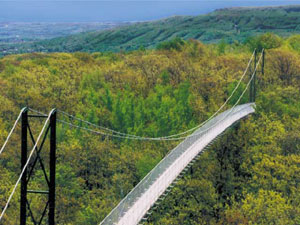
Situation is ‘dire’ for Ontario’s attractions
Industry association looking for help to survive

IAN STALKER
The CEO of an association representing Ontario’s diverse attractions is bluntly warning that current government relief efforts are not enough to keep many of the province’s tourism draws financially afloat and losing attractions in turn would be hugely damaging to the economies of the communities they’re in.
Troy Young of Attractions Ontario says nearly all Canadian attractions – such as bowling alleys, family entertainment centres, movie theatres and huge seasonal businesses like Canada’s Wonderland – have been shuttered since mid-March because of the coronavirus pandemic and cites a March 27 Destination Canada report that warned that within 60 days 60% of attractions may close permanently.
 “The situation is incredibly dire,” Young said. “Attractions are the demand generators for tourism. What will destinations have to market without attractions? No attractions means no one comes to the area to eat in restaurants, stay in hotels, access transportation. The entire (tourism) industry is built on its attractions base…If these businesses no longer exist, other hospitality businesses in the community will suffer – restaurants, hotels, retail, etc.”
“The situation is incredibly dire,” Young said. “Attractions are the demand generators for tourism. What will destinations have to market without attractions? No attractions means no one comes to the area to eat in restaurants, stay in hotels, access transportation. The entire (tourism) industry is built on its attractions base…If these businesses no longer exist, other hospitality businesses in the community will suffer – restaurants, hotels, retail, etc.”
Ottawa has brought in initiatives to help businesses in different sectors weather the coronavirus crisis but the tourism industry – which accounts for 10% of this country’s jobs – has been warning that many tourism businesses don’t qualify for the assistance.
“Attractions are falling through the gaps of the current measures; seasonal businesses do not currently qualify,” Young warns. “A 75% wage subsidy does not help attractions that have had to furlough their staff, and the new rent assistance is falling flat with landlords.”
The association says the outlook is alarming for attractions right across the country.
Attractions Ontario is calling upon the federal government to “step up and save this vital industry” through a new initiative it calls Save Our Attractions – www.saveourattractions.ca.
The goal is to “draw attention to the unique challenges faced by attractions across the county; and to ensure Canadian communities remain a vibrant place to live, work and visit.” Save Our Attractions is specifically asking the federal government to:
- Provide a government grant made up of the HST earned by the business during the last two quarters of 2019
- Provide forgivable loans through banks but funded and guaranteed by the federal government, paid back through newly generated HST.
- With no revenues coming in, traditional bank rations won’t work, the association states
- Extend the CEWS to the end of the quarter following the re-opening of attractions
- Make adjustments to the Canada Emergency Commercial Rent Assistance Program
“These businesses are shut because they were ordered to,” Young said. “And rightly so. As the economy reopens, attractions will face additional restrictions, including health and safety and capacity measures. Add to that a lack of tourists to help them recover, and you can see why, without help now, our neighbourhoods are going to be missing some great places.”
Destination Canada pegs the aid at $15 billion and notes the government announced a $9-billion aid package for students.
 Most of the resources the government has marshalled have been aimed at individuals who have been laid off. Attractions Ontario is arguing that aid should also be given to the businesses to ensure those individuals have jobs to return to.
Most of the resources the government has marshalled have been aimed at individuals who have been laid off. Attractions Ontario is arguing that aid should also be given to the businesses to ensure those individuals have jobs to return to.
“The most frustrating part of this is the government has known about this looming crisis now for 38 days and has not acted,” Young said earlier this month. “There are only 22 days left in their original 60-day prediction. Why is it taking so long for them to act?”
One hopeful sign is that governments are starting a phased reopening of businesses, but Young said attractions will be operating under guidelines that haven’t yet been spelled out. “There is still much unknown,” he said, adding his members’ success will depend on consumer confidence.
